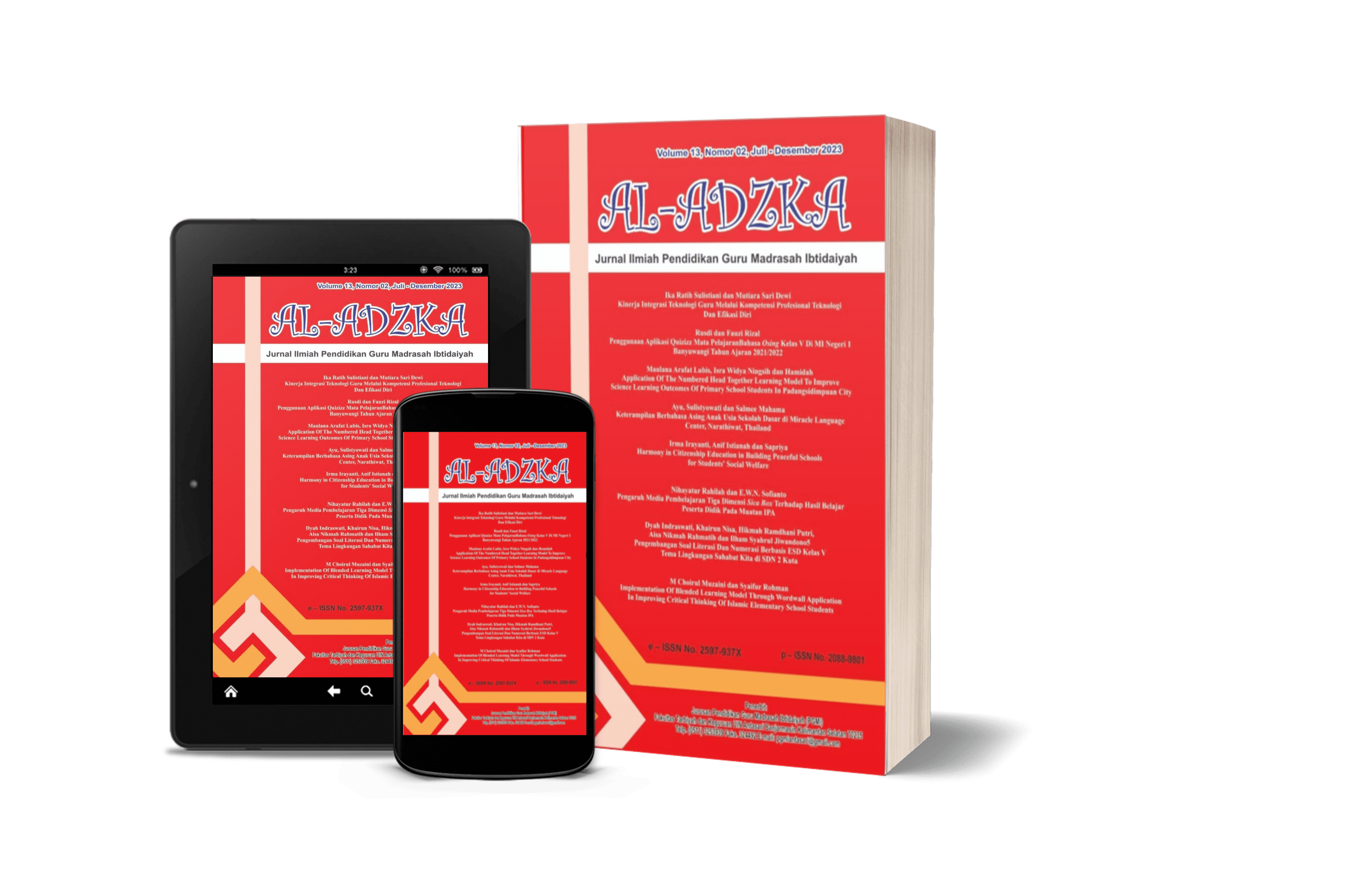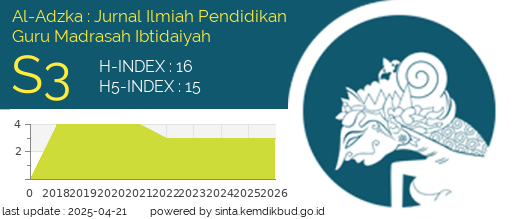Whatsapp-Based Online Learning on Social Science Subjects for Fifth-Grade Students in MIN 9 Hulu Sungai Selatan
DOI:
https://doi.org/10.18592/aladzkapgmi.v11i2.4772Abstract
The current situation due to the covid-19 pandemic has forced all parties with various considerations to issue a policy. One of them is closing schools by replacing face-to-face with online learning. The purpose of the study was to determine whatsapp-based online learning in Social Studies subjects Class V at MIN 9 Hulu Sungai Selatan as well as the supporting and inhibiting factors of learning. Data collection techniques using in-depth interviews and documentation. Furthermore, it was analyzed descriptively qualitatively. The results of this study indicate that whatsapp-based online learning in social studies subject class V at MIN 9 Hulu Sungai Selatan has been running smoothly, it can be seen through the planning, implementation and evaluation stages of learning. Planning with the teacher to make an appropriate lesson plan. The implementation of learning begins with preliminary, core and closing activities. Learning evaluation is carried out through post-test either with assignments or tests. Supporting factors are efficient quotas, mastery of teacher technology and coordination of teachers and parents. The inhibiting factors for the unstable internet network, limited mastery of technology owned by parents, the difficulty of controlling in following lessons make teachers less aware of which students already understand and do not understand.References
Khasanah, Dian Ratu Ayu Uswatun, dkk. (2020). Guruan dalam Masa Pandemi Covid-19. Jurnal Sinestesia. 10 (1) : 40-52
Hasanah, Aan dkk. 2020. Analisis Aktivitas Belajar Daring Siswa pada Pandemi Covid-19 Karya Tulis Ilmiah WFH. UIN Sunan Gunung Djati.
Harianto, Agus.( 2019). Guru di antara Kompleksitas dan Kontroversi. Yogyakarta: Penerbit Deepublish.
Somantri, Gumilar Rusliwa. (2005). Memahami Metode Kualitatif. Jurnal Makara, Sosial Humaniora. 9 (2) : 57-65
Anggito, Albi dan Johan Setiawan. (2018). Metodologi Penelitian Kualitatif. Jawa Barat: CV Jejak.
Bao, W. (2020). COVID-19 and online teaching in higher education: A case study of Peking University. Pedagogical Research, 5(4), 113-115
.https://doi.org/https://doi.org/10/1002/he2.191
Kusuma, J. W., & H. (2020). Platform whatsapp grup dan webinar zoom dalam pembelajaran jarak jauh pada masa pandemik COVID-19. Jurnal Ilmiah Guruan Matematika, 5(1), 97. https://doi.org/10.26877/jipmat.v5i1.5942
Briliannur Dwi C, Aisyah Amelia, Uswatun Hasanah, Abdy Mahesha Putra, Hidayatur Rahman .(2020) . Analisis Keefektifan Pembelajaran Online di Masa Pandemi Covid-19. Jurnal Guruan Guru Sekolah Dasar. 28-37
Yensy, N. A. (2020). Efektifitas Pembelajaran Statistika Matematika Melalui Media WhatsApp Group Ditinjau Dari Hasil Belajar Siswa (Masa Pandemik Covid 19). Jurnal Guruan Matematika Raflesia. 5 (2). 65- 74.
Nofita Puspa Dewi. (2020). Penerapan Pembelajaran IPA Daring Berbasis Whatsapp Group Untuk Siswa Madrasah Ibtidaiyyah Di Tengah Pandemi Covid-19. Jurnal Penelitian.14 (2), Agustus 2020 DOI : 10.21043/jp.v14i2. 8447 https://journal.iainkudus.ac.id/index.php/jurnalPenelitian
Dr. I Made Alit Mariana. (2016). Pengantar Perencanaan pembelajaran di sekolah dasar. Balu : LPLP Bali
Nini Ibrahim. (2014). Perencanaan pembelajaran teoritis dan praktis. Jakarta : mitra abadi
Mulyasa, E. (2009). Menjadi Guru Profesional. Bandung: PT Remaja Rosdakarya.
Downloads
Published
How to Cite
Issue
Section
License
Authors who publish with this journal agree to the following terms:
- Authors retain copyright and grant the journal right of first publication with the work simultaneously licensed under a Creative Commons Attribution 4.0 International that allows others to share the work with an acknowledgement of the work's authorship and initial publication in this journal.
- Authors are able to enter into separate, additional contractual arrangements for the non-exclusive distribution of the journal's published version of the work (e.g., post it to an institutional repository or publish it in a book), with an acknowledgement of its initial publication in this journal.
- Authors are permitted and encouraged to post their work online (e.g., in institutional repositories or on their website) prior to and during the submission process, as it can lead to productive exchanges, as well as earlier and greater citation of published work.












